‘Romulus’ director Fede Álvarez reviews the ‘Alien’ saga film by film: ‘We wanted to bring them all together’
The filmmaker, who has loved the franchise since he was a small child in Uruguay, says that he wanted to create a movie that would link all the sequels and prequels


When he was about 12 years old, in the early 1990s, Fede Álvarez pressed play on the VHS of Aliens, expecting to see a new Star Wars film. They were rerunning the saga for the imminent release of its third movie, and Álvarez wanted to see more spaceships. “Halfway through the film, I realized that it was much more violent and bloody,” he tells EL PAÍS via video conference. That moment changed everything.
The Uruguayan director was captivated by the Alien saga and dreamed of one day being able to control the xenomorph alien species that terrorizes spaceships. “Directing an Alien movie is something I’ve wanted to do for years,” he says. “When I finished Don’t Breathe [2016] I started with the plan of presenting my idea to Ridley Scott.”
The director of the first Alien movie welcomed Álvarez’s idea, acting as his mentor and producing his film. On the first day of filming, he gave him a note: “Good luck. Good health. Good hunting. Don’t fuck up. Very best.”
This is how Alien: Romulus was born. It is the first Alien movie under the Disney umbrella and the seventh in the saga (or ninth, if you count the two Alien vs. Predator films). In the movie — which is out now in cinemas — Álvarez returns to the roots of horror, but with a larger plan: to give coherence to the franchise and bring together the entire story: “My co-writer, Rodo Sayagues, and I wanted it to be like Tolkien’s rings, a film that brings them all together and binds them.” That’s why they all live in his head to a degree. Even the video game Alien: Isolation has influenced him. This is his review of the saga.
Alien (Ridley Scott, 1979)
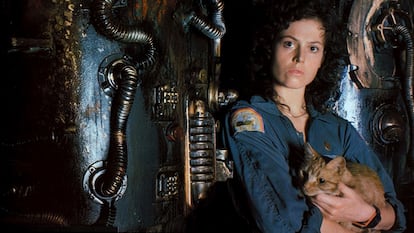
“What works is the simplicity, the terror and the effectiveness of discovering the life cycle of the alien’s transformations. What keeps you intrigued when you watch it is finding out what is happening, what this creature is, what it is looking for, what is going to happen to the person whose face it grabbed, what are they going to become,” he says.
“But the characters are very light. People love to talk about how incredible they are, but you don’t know anything about them, or where they are from, or what they want from life… It works because you don’t see the whole monster until the end. Then you discover its humanoid form, with those legs. I remember seeing it on television for the first time and that image leaving me in shock,” adds Álvarez, who has rewatched the movie numerous times and has special edition Blu-rays of it at home.
Álvarez wanted Romulus to recapture the terror of that first movie and the monster’s power of transformation. This was the idea that convinced Scott, who was very present during the filming. At the premiere in Los Angeles, Scott joked about the clashes he had with the director. Álvarez laughs: “He knows that when a director is given a lot of notes, the reaction is always to get angry. But the best comes out of that friction between director and producer. If you watch The Godfather or any masterpiece, the director never got 100% of what they wanted; there was a studio pushing. In that friction lies the truth. In recent years, we have seen what happens when streaming platforms let directors do exactly what they want: they don’t do their best work. So I appreciate Ridley’s strong point of view.”
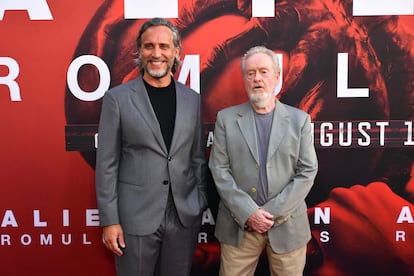
Aliens (James Cameron, 1986)
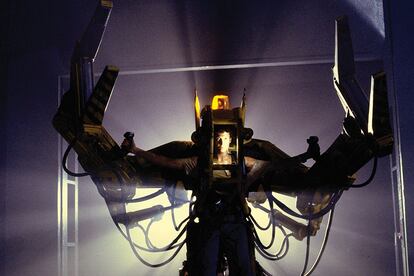
“Cameron pushed the story towards action and being a thriller, so they said it wasn’t horror, but as a kid it scared the shit out of me,” recalls Álvarez.
Alien: Romulus takes place exactly 20 years after Alien and 37 before Aliens. The director was obsessed with respecting the canon and not stepping on other director’s work. “The interplay between the two is what makes my film work. It’s the rebellious child of the two. It looks like both, but it wants to rebel and not be them. In the final minutes of the film, it fights for its own existence. That is also written in the dialogues of the protagonist, Rain [played by Cailee Spaney],” says the director of the film, where motherhood and childbirth are once again central themes.
This sequel sparked the idea that Álvarez presented to Scott: “I wanted the cast to be young. I wondered what it would be like if teenagers like Newt, the girl from Aliens, had grown up in this colony. I thought they would want to have escaped from there. My other argument was that I wanted to tell the story of the friendship between a human and an android, which Ridley has always been fascinated with because of Blade Runner.” The android played by David Jonsson is the emotional and discursive center of the movie.

Álvarez also showed Romulus to Cameron, from whom he took ideas such as anti-capitalism or doubts about machines, and turned them into a reflection on how artificial intelligence is used by corporations: “Cameron was very precise with the technology, geography and science fiction. He pushed me into making it clear where they enter and where they are located in the ship, orientation that help you.”
Alien 3 (David Fincher, 1993)
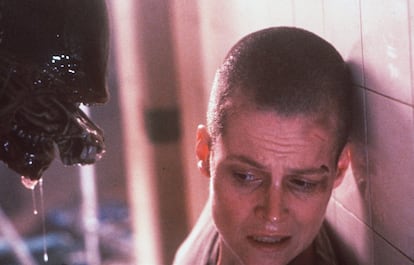
The third installment of the Alien saga is set in a penal colony. The movie was heavily criticized, but Álvarez defends it: “I still like it. What many people don’t understand today is that each movie is a child of its time. The first one is against corporations, when the U.S. begins to wake up and understand that companies are not interested in the individual.”
“Cameron’s movie is released in an era of pop and optimism, but also after the Vietnam War,” he continues. “Fincher comes in, when we are all starting to set fire to our Guns N’ Roses and Poison CDs, and Nirvana and grunge is making us understand that nihilism was more enjoyable than the high of the 1980s. It’s exactly the film that people needed. That’s why it starts and kills off all the characters we know. I loved the idea of suddenly seeing something raw and realistic. I was in the front row, in my first as a fan, and at that moment all the talk was about the fact they’d cut off Ripley’s [Sigourney Weaver] hair. Her shaved head would have broken the internet today; It was quite unique for a female protagonist, all cold and nihilistic. But to me, it showed the filmmaker’s amazing bravery. He had balls.”
Alien: Resurrection (Jean-Pierre Jeunet, 1997)
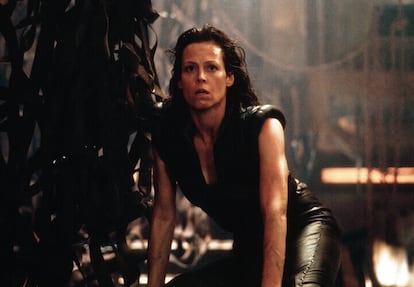
For the fourth film, a strange choice was made, both in terms of plot and of director. Jeunet — a creative and visual French filmmaker — sets the action 200 years into the future, while the script by Joss Whedon fuses the heroine with the alien. “I loved it,” says Álvarez. “At that time, if you asked me who my favorite director was, I would say Jean-Pierre Jeunet. We were coming off Delicatessen and The City of Lost Children. It was the best news, and I really enjoyed seeing all the actors, Pinon and the rest. But today what I find difficult is that Ripley wasn’t there, she’s dead, and her character is not her. She’s absent, in transit and hypnotized by the alien. That’s what makes her not as effective.”
Prometheus and Alien: Covenant (Ridley Scott, 2012 and 2017)

Before Ridley Scott returned to the franchise, Hollywood released two Alien vs. Predator movies, which narrates the conflict and origin of the creatures, but no one was a fan of them. “There is no parallel, I don’t think they are part of the same line [of movies],” Álvarez answers elegantly.
When Scott directed the next Alien movies decades later, he also wiped the slate clean. Throwing in a mix of philosophy and gods, the director decided to look back at the creation of the xenomorphs. Alien: Romulus curiously owes a lot to the reinvention of Prometheus and draws from it some of its most groundbreaking ideas. Indeed, the first time he proposed his idea, Scott was filming Covenant.
“I was shooting Evil Dead, my first film, when Prometheus came out, and the crew went to the cinema. The next day on set, we talked about nothing else, we debated and philosophized about what the film meant, what it talked about, its responses… The commotion it generated is a huge achievement. And there is a new generation that sees these two films as the best, because it hit closer to home,” says Álvarez.
The director totally embraced the movie, and the ideas it sparked helped him develop his own vision, one that could possibly make a return. “Hopefully,” says Álvarez, who first learned in the distant Uruguayan city of Montevideo that in space, no one can hear you scream. “Now I’m delighted to show them to my nine-year-old son.”
The Alien saga continues to rouse interest, and in 2025, there will be a new movie: Alien: Earth, directed by Noah Hawley, who imagines what would happen if the monster reached Earth.
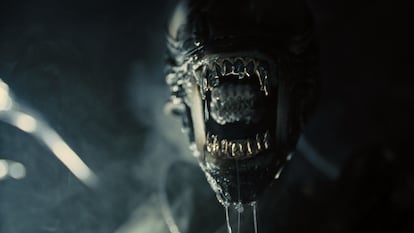
Sign up for our weekly newsletter to get more English-language news coverage from EL PAÍS USA Edition
Tu suscripción se está usando en otro dispositivo
¿Quieres añadir otro usuario a tu suscripción?
Si continúas leyendo en este dispositivo, no se podrá leer en el otro.
FlechaTu suscripción se está usando en otro dispositivo y solo puedes acceder a EL PAÍS desde un dispositivo a la vez.
Si quieres compartir tu cuenta, cambia tu suscripción a la modalidad Premium, así podrás añadir otro usuario. Cada uno accederá con su propia cuenta de email, lo que os permitirá personalizar vuestra experiencia en EL PAÍS.
¿Tienes una suscripción de empresa? Accede aquí para contratar más cuentas.
En el caso de no saber quién está usando tu cuenta, te recomendamos cambiar tu contraseña aquí.
Si decides continuar compartiendo tu cuenta, este mensaje se mostrará en tu dispositivo y en el de la otra persona que está usando tu cuenta de forma indefinida, afectando a tu experiencia de lectura. Puedes consultar aquí los términos y condiciones de la suscripción digital.








































